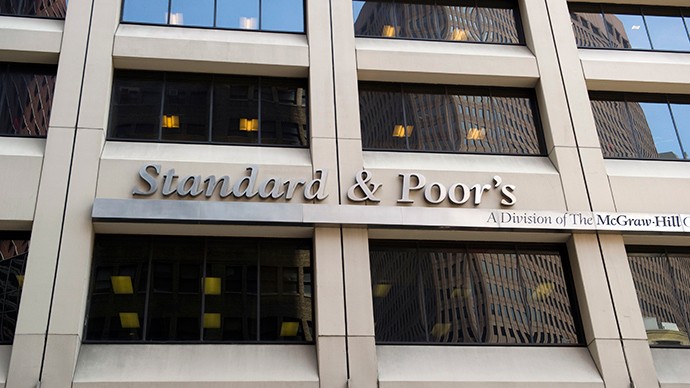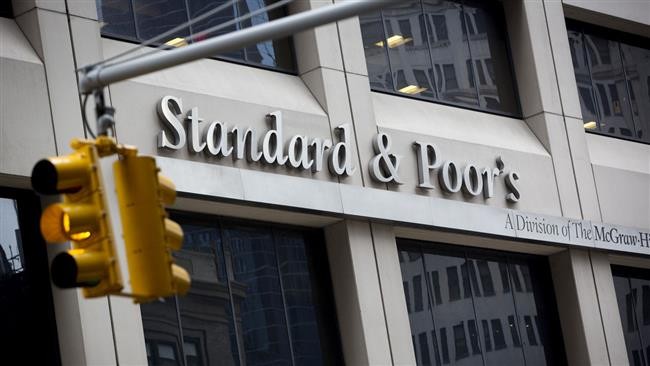BREAKING S P downgrades Russia s credit rating to junk
Post on: 1 Май, 2015 No Comment

t.co/7yCH0jG0fE
Maxim Tucker (@MaxRTucker) January 26, 2015
#USDRUB strengthening following S&P downgrading #Russia credit rating to junk pic.twitter.com/Cgl78tLyuF
Open Europe (@OpenEurope) January 26, 2015
S&P downgrades Russias credit rating to junk
US-based credit rating agency Standard & Poor’s has cut Russia’s sovereign rating to BBB-, leaving it below investment grade for the first time in a decade. Moscow termed the decision overly pessimistic.
“The downgrade reflects our view that Russias monetary policy flexibility has become more limited and its economic growth prospects have weakened. We also see a heightened risk that external and fiscal buffers will deteriorate due to rising external pressures and increased government support to the economy,” said a statement from the agency.
The ruble fell from 66.3 to over 69 per dollar. As it experienced downward pressure through the early hours of Monday, the Russian currency has now fallen by over 8 percent since the previous trading day.
Russias Finance minister said S & Ps move was overly pessimistic, and did not take into account the strengths of the Russian economy. Among its advantages he listed Russias considerable foreign currency reserves, a positive balance of payments, and low levels of state debt. The official urged investors to avoid dramatizing the situation.
New war tactics: you can do more damage to a country downgrading their credit rating than bombing a major city.
— Max Keiser (@maxkeiser) January 26, 2015
In contrast, in their breakdown, S&P analysts drew up a bleak future for Russia’s economy, which is predicted to shrink this year.
“We project that the economy will expand by about 0.5% annually in 2015-2018, below the 2.4% of the previous four years,” says the report.
It blames both the structural problems of Russia’s economy, and the cycle of Western sanctions and counter-sanctions imposed since the succession of Crimea from Ukraine last March.
“We see this muted projected growth partly as a legacy of a secular economic slowdown that had already begun before the recent developments in the Ukraine. It also reflects a lack of external financing due to the introduction of economic sanctions and the sharp decline in oil prices.”
Russian Central Bank voids Standard & Poor’s, Moody’s, Fitch ratings
The Central Bank of Russia will no longer use credit ratings from Standard & Poor’s, Fitch, or Moody’s that were assigned after March 1, 2014.
All credit ratings given to Russian companies and banks will now be at the discretion of the Board of Directors of the Bank, according to a press statement Monday. The regulator will assess whether or not the ratings made after March are accurate.
“According to the Bank of Russia Board of Directors’ decision, the rating date for credit institutions and their issued financial instruments, including securities, to implement Bank of Russia regulations, shall be 1 March 2014; as for other entities, listed in the ordinance, and their issued securities, this rating date shall be 1 December 2014,” the press release said.
The decision comes after Fitch and Moody’s downgraded Russian sovereign debt to just above junk status. Standard & Poor’s will decide whether it cuts Russian debt to junk level by the end of January.
Ratings cuts by the international agencies have increased since Crimea rejoined Russia in mid-March; at the same time the West began to levy sanctions against Moscow.
On Friday, Moody’s cut Russia’s government bond rating to Baa3 from Baa2, just one level above junk. The agency also forecast the economy will contract 5.5 percent in 2015, and an additional 3.0 percent in 2016.
Fitch downgrades Russia’s credit rating to 1 notch above junk level

The international ratings agency has knocked Russia’s credit rating down a peg, while warning that ‘growth may not return until 2017,’ as the national economy struggles amid sanctions and tumbling oil prices.
Fitch Ratings Inc, with dual headquarters in New York and London, downgraded Russia’s credit rating to BBB- from BBB, which is just one step away from the non-investment field.
While not yet the worst rating, Fitch nevertheless predicted a rough road ahead for the Russian economy, which has witnessed a dramatically weakened ruble together with steadily declining oil prices.
Fitch said Russia’s Gross Domestic Product will decrease by four percent this year, which is significantly worse than the 1.5 percent decline it had anticipated.
Growth may not return until 2017, Fitch warned.
A storm of factors, including plummeting oil prices, turbulence with the national currency and sanctions slapped against the country in the aftermath of the Ukrainian debacle, have made the Russian economy particularly vulnerable.
‘Negative press about Russia affects Fitch ratings’
Excessive negative press can indirectly affect ratings, Ben Aris, Editor in Chief of Business New Europe told RT. Russia’s downgrade doesn’t reflect instability, just as 2008 proved a triple A Fitch rating doesn’t necessarily guarantee economic stability.
RT: How reliable are they? They couldn’t detect the credit crunch back in 2008, for instance…
Ben Aris: Indeed, I mean the credit agencies have come in for a lot of criticism in the past for basically getting it wrong. I mean, they were handing out investment triple A ratings to some of the assets that then collapsed in spectacular fashion in 2008. So they haven’t made themselves particularly reliable. Moreover, independent studies have compared some of the western credit agencies ratings of countries like Russia – compared to those coming out of the newer agencies like those in China and Russia – have found significant differences. The macroeconomic look of Russia – the fundamentals are actually pretty strong, and could argue for a higher rating than it gets.
It makes a significant difference. The economics minister said that a downgrade of one notch like this is going to cost Russia an extra $20 or $30 billion because there’s a metric which is used to price the cost of risk, so each notch you downgrade, you add a certain cost to cover the extra risk – and that’s mechanical, when people are pricing bonds. So in the short term this is going to cost Russia a couple of tens of billions of dollars, at a time when it’s still scrabbling around for money, so it’s going to make life more difficult.
t.co/Nj61r9YoMw
Bloomberg Business (@business) January 26, 2015














